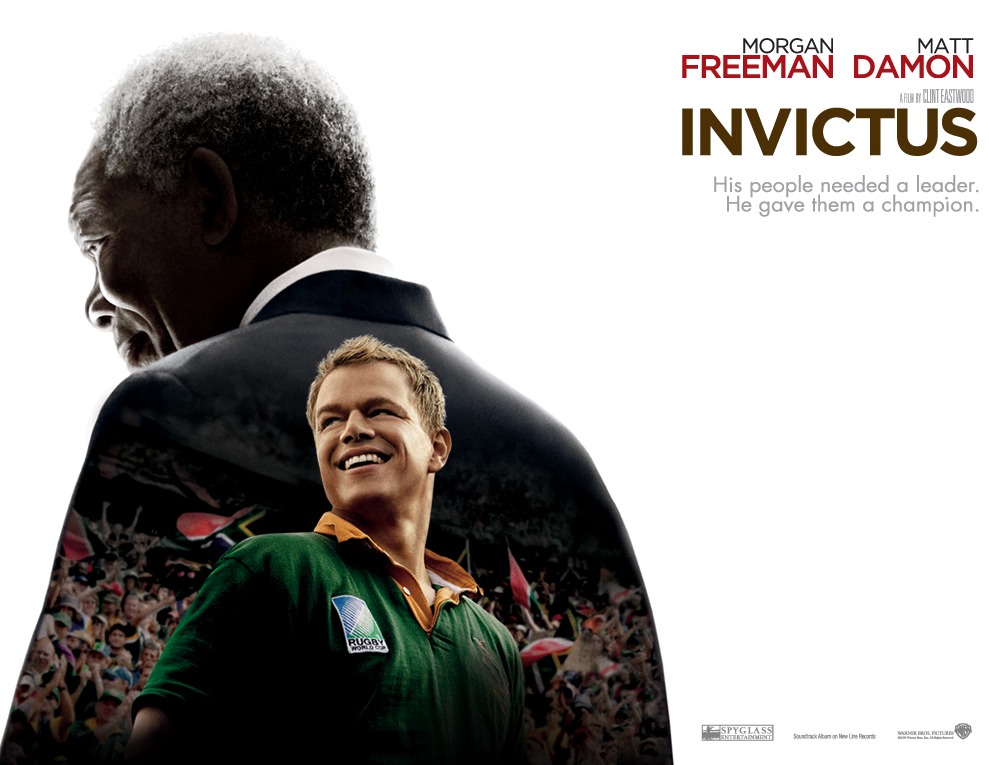
I just watched Clint Eastwood’s new film on South Africa’s victory in the 1995 rugby World Cup, one year after the country’s first democratic elections. Invictus (the title comes from an inspirational Victorian poem) stars Matt Damon as François Pienaar, captain of the Springboks, and Morgan Freeman as Nelson Mandela. Based on John Carlin’s book Playing the Enemy, it’s pretty good for a sports movie, a genre not usually associated with great cinematography.
The basics: thanks to Mandela’s stewardship, an all-white team (with one exception) goes from representing a sport synonymous with white supremacy to embodying the seemingly boundless potential of the postapartheid “rainbow nation.” There are some good moments. Like the team’s surprise visit to Robben Island prison, where the apartheid regime imprisoned Mandela and many other black activists during the country’s struggle for freedom. Props to Damon’s rugby moves, which are almost as good as his Afrikaans-inflected English, and to Freeman for closely matching Madiba’s physical movements and cadence. I enjoyed some of the sporting action as well, particularly the camera shots from inside the scrums.
Regrettably, sentimentality and cheesy music weaken the film. The lack of historical context and the refusal to develop any of the film’s characters (except Madiba) are also striking. We never get to know where the players come from, what their lives are like, and what happens to them after The Game. Same goes for the black and white bodyguards — a constituency usually at center stage only in movies such as In The Line of Fire and its ilk. While the final scenes project the fiction that 1995 transformed rugby from a white-dominated sport to a fully integrated one, the truth is much less uplifting. But then again, this is Hollywood history.
Categories
3 replies on “South African Sport, Hollywood-style”
This was always going to be a glamorised, Hollywood-esque affair, not least with the casting of Matt Damon as Francois Pienaar. Should we have expected Hollywood to provide the historical context and a critical analysis of rugby and race relations in South Africa? This would have catapulted the film producers into a pseudo-academic role. Maybe the onus should be on academics with experience and knowledge in this field to disseminate this knowledge to a wider, non-academic audience?
I wish I could watch the film but as it is always with film release dates in the UK, we won’t get it for another couple of months. Even South Africa has this film before us…
Of course, academic documentaries bore people to tears (including some academics) unlike Hollywood edutainment like Invictus.
However, this film is “pseudo-academic” — “based on a true story”, shot on location, recreating history — so it’s not asking too much to expect just a little more attention to context and the game’s aftermath. Otherwise, the film runs the risk of going down the path of Disney’s “Glory Road” (http://sports.espn.go.com/espn/page2/story?page=merron/060112).
An idea for context on early 1990s: include shots of the AWB crashing their truck into the World Trade Center in Johannesburg in 1993 and the killing of the AWB men on television in Bop in 1994. These brief, yet dramatic, scenes would have helped better understand why Madiba was so committed to undermining the extreme right wing by standing up for the ‘Boks name and emblem.
One recent examples of an academic project going Hollywood is Chuck Korr’s More Than Just a Game (http://www.morethanjustagame.co.za/pr_5.html), a film on soccer among prisoners on Robben Island. I have not yet seen the film (it has not been released in the US and is not available on DVD here) so can’t comment on it.
Final note: many of my undergraduate and graduate students went to see Invictus and inundated me with positive feedback.
Hi, I thought you and your readers might be interested in a related new documentary, Fair Play, which explain why the ‘95 World Cup was so important to Mandela and the world. Here’s a trailer: http://activevoice.net/haveyouheard_fairplay.html.